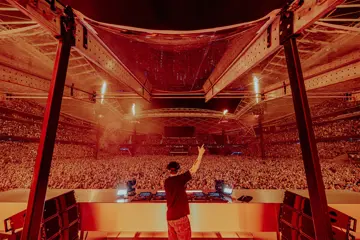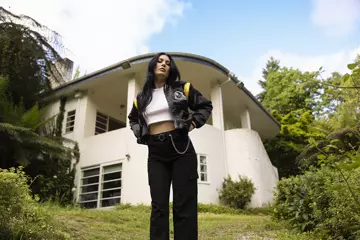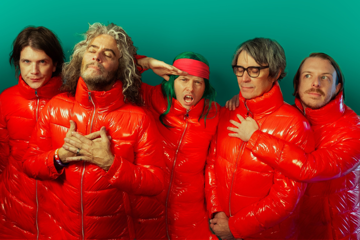Sammy J, aka Sam McMillan, sums up what makes him laugh succinctly: “Things that are unexpected, like laughter at a funeral or tears at a wedding.”
I ask for a little clarity – I’m a massive crier at a wedding. And reckon most funerals devolve into laughing fits, a seemingly natural reaction to the sombreness of the occasion.
“Tears like someone’s fallen over [at the wedding],” McMillan explains. “There’s often so much laughter at funerals because it binds people together.”
But what is it about the unexpected that so tickles the 35-year-old comedian?
“I think I've always liked when the facade of society crumbles or someone finds a little chink in the armour," he shares.
“If something is meant to be taken seriously or trying hard to be taken seriously then I just enjoy seeing the rug being pulled out from under that thing's feet, whether it's a person or a concept.”
Sammy J – who last week kicked off his Sammy J’s Major Party tour – has for the last year-and-a-half been crafting satirical, political sketches for the ABC. He links his interest in “pricking pomposity” with his political comedy: “The DNA of satire is making fun of people with power.
“I enjoy catching people or seeing people get caught off guard, not in a cruel way, but just when there's something that you can call bullshit on.”
Don't miss a beat with our FREE daily newsletter
Still, while he’s working in a satirical space now, he doesn’t see any obligation for comics to address difficult things about the world in which we live in 2019.
“My job at the moment is making fun of politics and society in a satirical way, but I put that secondary to my job as a comedian, which is just to try to make people laugh. If I stop this job in a year or two then I'll revert to just stupid songs or things with Randy that have no satirical value whatsoever.”
His approach is very much shaped by the principle that we should be punching up and speaking truth to power, rather than throwing punches every which way. “In my early comedy I never really had a concept of that,” McMillan admits, “it was just desperately trying to get a laugh from anyone or anything.
“But these days and particularly since I have a bit of a platform now I guess with the work that I do for ABC, I'm really conscious of not making people a punch line when they don't have the ability or the platform to respond. So pretty much every script or joke I write now I would have that in the back of my mind.”
He notes that the way he tries to get laughs has changed since he was younger – he still has the same sense of humour he had as a kid, but the way he expresses it has changed, as have his abilities as a comedian: “Some of the work I do now, I just didn't have the confidence or the skills to do ten years ago.”
Thinking back to his school years, he describes himself as a “weird, little, slight attention-seeking nerd”, at first reserved and shy in early primary school, before his parents divorced when he was in Grade Two or Three, at which point he "started seeking love in the playground by being the class clown,” he laughs.
“At school I was a professional troublemaker. So we had sports events where everyone had to be in their certain house colours – I just made a technicolour dreamcoat that had all the colours in it and pretended I was supporting every team. Seven people found it funny but that was enough for me.
“Another day I just organised a picnic in the schoolyard, like I brought a full picnic hamper and a blanket and different courses and laid them out on the school oval at lunchtime, just because I thought that'd be funny.”
So from those schoolyard hijinks – which also included slowly but steadily inching his desk out of the room during class – the urge to make people laugh for a living just seemed like an obvious progression.
"I'd had enough people telling me that I should be a comedian or that I was funny that I never questioned it, I just threw myself into it.”
“I think I started making people laugh at school to try to fit in – it's so dull and that's what every comedian would say, but it's true. I didn't really have another skill going for me, I wasn't good at sport, I was a bit of a weirdo or a shy type, and when I found I could make my classmates laugh then I really enjoyed that buzz and the adrenalin rush.
“That was when I was ten years old, so by the time I finished school it was just a natural thing for me to pursue. I'd had enough people telling me that I should be a comedian or that I was funny that I never questioned it, I just threw myself into it.”
When pressed for specific memories of laughing really hard – whether from childhood or more recently – McMillan struggles to come up with an answer that he deems appropriate or that truly responds to the question; instances where he laughed and wasn’t the one making others laugh.
“I once did a 40-second fart in a business meeting,” McMillan begins. “But that's not really an answer to your question because I wasn't the one laughing, it was everyone else, but I stayed there with a straight face the whole time.
“That was a specific comedy moment that I've never revealed in public. It makes me laugh now when I look back at it. Just like a very high, thin, tin whistle-pitched piece of flatulence. It was almost a performance piece.
“I outsource my laughter. I try to put the laughter into other people's souls and to hear them laugh – that's what makes me laugh on the inside, but not the outside. I should be a fucking politician now, how's that for an answer?”
That ability to keep a straight face is another layer to Sammy J’s sense of humour: “I'm inwardly chuckling all day long.
"That's the thing – you may not see me laughing but I'm enjoying myself at every moment.”
He stresses that his difficulty articulating precise moments he found outrageously funny isn’t because he’s “some dead man with no joy in life”.
“I do laugh a lot, I promise,” he insists, mentioning that laughter often arrives in writing process, whether with his long-time puppet collaborator Randy (Heath McIvor) or other co-writers, when they have a good idea.
“Name any friend of mine or someone I work closely with and we'll have our own language, our own humour language and our own rhythm."
What makes Sammy J laugh the most are the in-jokes he shares with people like his best friend, McIvor, and his wife, Hannah. But the thing about those jokes is that, by their very nature, you can’t explain them to other people because they’d make no sense.
“When [Randy and I are] writing together, we'll sometimes literally roll on the floor laughing for 15 minutes based on a stupid impression of someone we know or a stupid joke.
“Name any friend of mine or someone I work closely with and we'll have our own language, our own humour language and our own rhythm and the things that'll make us laugh based on our shared experiences,” McMillan explains.
The idea of in-jokes, for Sammy J, relates to the concept of public versus private comedy – the jokes we tell with our loved ones, with the people who just ‘get’ our senses of humour, versus the ones we tell on stage or in writing or on social media.
“People make an offensive joke online and then get slammed for it – often rightfully so – and then say, 'Oh, it was just an in-joke.' I always think, 'No, it's not an in-joke if you're not controlling the audience.'
“I say some horrible, horrible shit when I'm with a friend or two as everyone does for a laugh because you know that they will take it exactly as intended, you know that they will understand it is just a joke, you know that all the caveats that go into that are there and exist.
“But as soon as you take that to a broader audience you can't control the audience it's going to reach.”
But at this stage of Sammy J’s career – McMillan won Best Newcomer at MICF back in 2006 – he’s managed to find an entire audience of fans who ‘get’, and pay to see, his in-jokes.
“I feel like I've found that audience who shares my little sense of humour so when it comes to doing the live shows or whatever it is, I can start from that level of, 'Oh, we all have the same sense of humour, we're all aware of how stupid this is, and we're all speaking the same language.'
“I think that's, as a comedian, that's probably what, in a way, everyone is after, is finding your own little collective in-joke crowd and them being cool with the fact that there will be other people out there who just don't find that funny at all.”
Sammy J is on tour now.
















